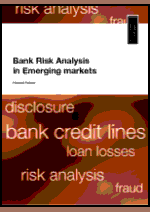Книги
Bank Risk Analysis in Emerging Markets
Palmer, H. Bank Risk Analysis in Emerging Markets / H. Palmer. — London : Euromoney Books, 1998. — 212 p.. — . Анализ банковских рисков в странах с развивающимися финансовыми рынками.. Содержание : Introduction - the real problems ; Political or bank risk? ; A transactional analysis of bank risk ; Annual reports - barriers to transparency ; How to analyse a bank's balance sheet ; Spreading the bank's balance sheet ; Banks in emerging markets - a management grid matrix ; The nature of capital ; Avoiding fraud and failure - The Crocodile System ; Collection of interbank debts in emerging markets ; Accept or reject? - 'pinball' line management ; The virtual reality of bank risk analysis ; The 15-step grid (full version) ; The Estonian banking review. — 6955.00 р.
Аннотация
Banking is a risk business, but one mistake can wipe out a year's profits or more. Correspondent banking is a reliable, high yield activity, and trade finance in the emerging markets offers some of the highest returns available in conventional banking. However, as the banker ventures into the emerging markets he finds risks which hardly exist in the developed economies. Balancing risk and reward is critical to maintaining profits and reputations, as well as operational independence. It is all too easy to be seduced by the high yield on a short-term trade transaction, and to enter a deal without a thorough examination of the obligor. A review of the spreadsheet provided by a rating agency tells little more than the size of the bank and its own view of its profitability, and annual reports from emerging market banks are apt to be little more informative. A real understanding of the nature of the bank, the quality of its management and the probability of central bank support in case of need is also required. As the author, Howard Palmer, so ably points out, transaction risk when dealing with banks in emerging markets is very much higher than in the correspondent banking relationship encountered in the developed world, and bankers ignore this at their peril. The tried and tested methods of dealing with the leading banks only in countries with good international exchange positions do not apply in the new markets. In emerging economies, bankers cannot rely on the implicit guarantee of efficient supervision and probable bail out or rescue of banks in difficulty which is common in developed countries. Instead, they must devote care and attention to appraising the real risk of dealing with small and perhaps newly established banks, with only the most rudimentary accounts to guide them.
Отзывы читателей
0
